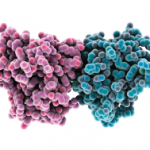Although ACPAs are strongly associated with RA, the vast majority of individuals who possess the SE do not develop RA. Genome-wide association studies employing single-nucleotide polymorphisms (SNPs) have identified more than 30 different additional non-MHC genetic associations in patients with RA. The majority of the associations have been identified in ACPA-positive patients, although the PTPN22, CTLR4, and IL2RB SNPs have also been associated with those who are ACPA negative, in some but not all studies, and they appear to contribute less overall risk in the ACPA-negative patients.
The functions of the genes associated with RA, other than the MHC locus, are just beginning to be understood. SNPs in PTPN22 have been associated with a number of antibody-mediated autoimmune diseases, including RA and systemic lupus erythematosus.7 PTPN22, which is expressed primarily in hematopoietic cells, is a phosphatase that is capable of inactivating certain aspects of cell activation. Recent studies have observed that individuals expressing the PTPN22 allele encoding a R620W variant that is associated with autoimmune diseases demonstrated deficiencies in the deletion of autoreactive B cells, which may contribute to increased autoantibody production.8 Further expression of the disease-associated variant in mice resulted in enhanced activation of lymphocytes and dendritic cells, which may increase autoantibody production. Of great interest, the disease associated variant of PTPN22 containing the R620W, when expressed in experimental mice, was rapidly degraded compared with the other variants.7 Supporting the relevance of more rapid degradation to disease, both healthy controls and patients with RA who carried two copies of the risk allele demonstrated reduced levels of PTPN22 in peripheral blood mononuclear cells. Together, these studies suggest that the disease-associated variant of PTPN22 results in more rapid degradation of the phosphatase, leading to an increase in lymphocyte and dendritic cell activation, permitting the survival of autoreactive B cells.
SNPs in TNFAIP3 or A20 gene are also associated with RA. TNFAIP3 is generally weakly expressed, but is strongly and rapidly induced by activation through TLRs or TNF receptors, mediated through NF-kB activation. The induced TNFAIP3 suppresses ongoing activation resulting from TLR ligation, providing an important mechanism to attenuate the inflammatory response. Of great relevance to RA, mice deficient in TNFAIP3, specifically in macrophages, develop a spontaneous arthritis resembling RA.9 However, it is not clear how the RA-associated TNFAIP3 may function. Therefore, it is possible that the SE plus PTPN22 and TNFAIP3 SNPs, as well as any of the other identified SNPs, in combination, provide the background, allowing for the perfect storm that culminates in RA.

